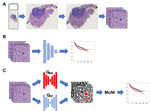Toby C. Cornish
Professor of Pathology and Data Science Institute
Medical College of Wisconsin
Froedtert Health
Biography
++This page is being revised++
Toby Cornish M.D., Ph.D. is a Professor in the Department of Pathology and the Data Science Institute at the Medical College of Wisconsin, where he practices gastrointestinal pathology and clinical informatics. He was recruited to the University of Colorado (CU) in 2016 from Johns Hopkins, where he had a similar role in the Hospital and University. While on faculty at Johns Hopkins, he was Co-director for Imaging and Image Analysis of the JHU Oncology Tissue Services Lab and developed or co-developed several software packages for biomarker quantitation, including TMAJ/FrIDA, PIP, and HPASubC. In his current position, he serves as the Vice-Chair for Pathology Informatics, Medical Director of Informatics for the Pathology Department, and Medical Director of the LIS for the UCHealth system. Dr. Cornish was the 2023 recipient of the University of Colorado Department of Pathology’s Pathologist of the Year Award. In August of 2023, he was granted Tenure by the University of Colorado Board of Regents.
His interests include histologic image analysis, digital pathology, and artificial intelligence/machine learning. Dr. Cornish is a member of the HIMSS-SIIM Enterprise Imaging Community’s Multimedia Interactive Content Reporting Workgroup, the HIMSS-SIIM Enterprise Imaging Community Advisory Council Member, the College of American Pathologists Artificial Intelligence Committee and previously President of the Association for Pathology Informatics (2022). He was named to The Pathologist magazine’s Power List 2020 for Big Breakthroughs, serves on the Editorial Board for Modern Pathology, and is the Associate Editor for Informatics of the American Journal of Clinical Pathology.
Download Dr. Cornish’s curriculum vitae.
- Clinical Informatics
- Pathology Informatics
- Artificial Intelligence
- Digital Pathology
- Computational Pathology
- Histologic and Cytologic Image Analysis
- Gastrointestinal Pathology
- Pancreaticobilliary Pathology
- Pancreatic Neoplasia
-
Clinical Informatics Certificate, 2011
Johns Hopkins University
-
Gastrointestinal and Liver Pathology Fellow, 2010
Johns Hopkins University
-
Anatomic Pathology Resident, 2009
Johns Hopkins University
-
PhD in Neuroscience, 2004
University of Illinois Urbana Champaign (UIUC)
-
MD, 2005
University of Illinois Chicago (UIC)
-
BS in Biochemistry, 1995
Bradley University
Profiles
- ORCiD : 0000-0002-1902-2109
- ResearcherID: A-4394-2015
- Scopus Author ID: 35326607400
- ISNI: 0000000125723748
- Google Scholar
- NCBI Bibliography
- Zotero
- CU Medicine
- CU Pathology
- Doximity
- ResearchGate
Recent & Upcoming Talks
Recent Publications
Contact
- [email protected]
- 9200 W. Wisconsin Avenue, Milwaukee, WI 53226
- WDL Building, Room 208 (2nd floor)
- DM Me







